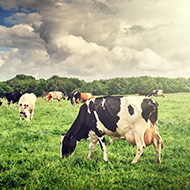Ireland study to explore immunology of bovine TB

An estimated 30-40 per cent of TB-infected herds in Ireland experience a repeated breakdown within three years.
Researchers across Ireland have joined forces in a first-of-its-kind study to better understand the immunology of bovine TB.
Scientists from The Institute for Global Food Security (IGFS), the Agri-Food and Biosciences Institute (AFBI) and University College Dublin (UCD) will explore how nutrition and Vitamin D might influence animals' immune response and disease outcomes on farms that experience recurring infection.
Project lead Dr Kieran Meade, from the UCD School of Agriculture and Food Science, said: “Multiple studies now point to an animal-specific issue that prevents current diagnostic tests from identifying all truly infected cattle, and these cattle act as a reservoir of persistent infection.
"The weight of evidence from the human literature and our exciting preliminary data suggests that Vitamin D status will have a decisive impact on livestock immunity to diseases including TB.”
Owing to a relapse of infection on farms on both sides of the Irish border, it is thought that TB-infected herds have a 30–40 per cent probability of experiencing a repeated breakdown within three years. Experts say that to eradicate bTB, the UK, Ireland, and the EU must intensify focus on the causes of recurrent infection.
Professor Ilias Kyriazakis of IGFS, who has a background in veterinary medicine, said: “Queen’s has previously associated Vitamin D status of livestock with their immune response to a variety of pathogens, and this exciting collaboration offers us the opportunity to build on our previous research.”
The researchers aim to identify the host factors contributing to the relapse of infections in specific cattle or herds, and use this knowledge to inform strategies for TB eradication, both in NI and ROI.



 The latest
The latest